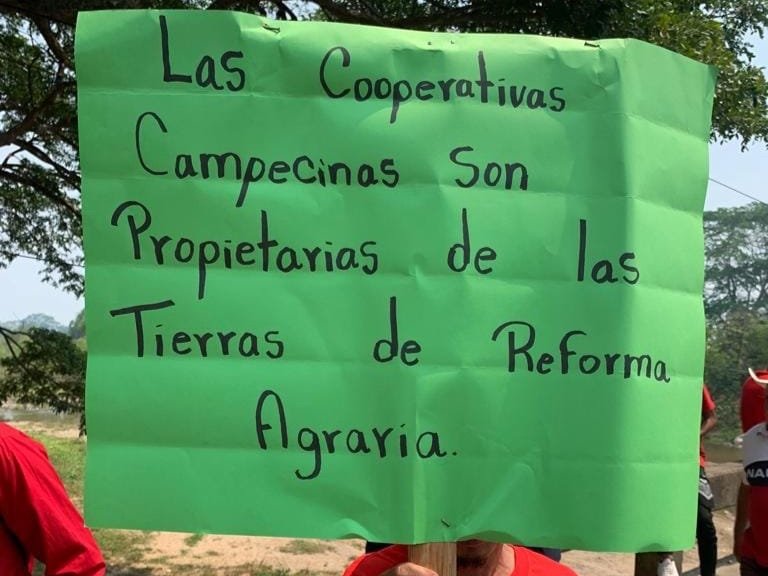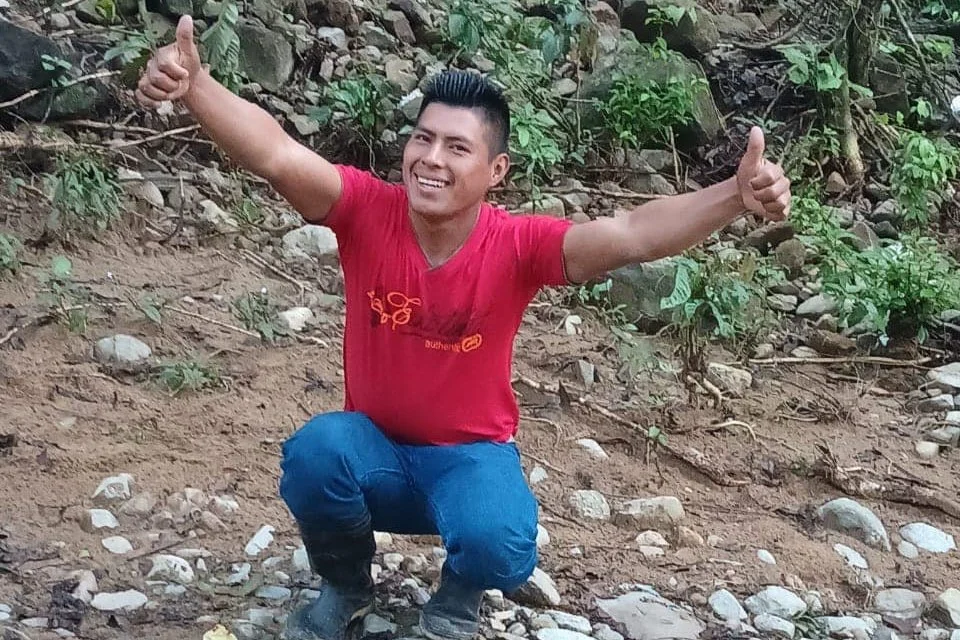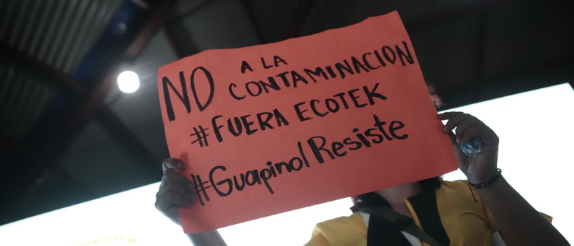Aguán News Alert | December 2024
Image Description: Campesino holds up a sign saying “The campesino cooperatives are owners of the agrarian reform lands.” | Photo Credits: Plataforma Agraria.
Campesino Families Face Violence from Agro-Industrial Groups
Tocoa, Colón, Honduras. – Campesino families in the Bajo Aguán region of Honduras are once again threatened by violence caused by organized crime and agro-industrial companies, who use misinformation strategies on social media, harassment and physical attacks to violate the human rights of campesino people.
On December 24, 2024, the Camarones Cooperative was victim to an extrajudicial eviction by an armed group called "Los Cachos", who maintain a permanent and close relationship with the agroindustrial company DINANT and the armed group "Los Canechos", who operate on the left bank of the Aguán River. The armed individuals carried high-caliber weapons including AK47s and R15s, threatening and shooting at the members of the Camarones cooperative and at police officers who were in the area.
The escalation of violence in the area culminated in the murder of Arnulfo Diaz, a member of the Brisas del Aguan Cooperative, on January 2, 2025. This situation has generated a feeling of anxiety within the families who find themselves without the necessary state-protection in the face of attacks carried out by criminal groups at the service of agro-industrial companies.
For the past 7 months, the Agrarian Platform and COPA have been denouncing the plan of the criminal group “Los Cachos” to carry out a violent and extrajudicial eviction against the Camarones Cooperative. Likewise, they have denounced the repeated attacks that the families of several campesino cooperatives in the same area, including Camarones, Chile and Tranvio, have suffered by this armed group.
In response to the violence carried out, the organized people of Aguán have been forced to peacefully protest to demand a response from the State of Honduras, making an urgent call to the National Commissioner of the Honduran Police, the Minister of Human Rights and the Mechanism of Protection to safeguard the lives of campesino families who claim their legitimate rights to the land.
Image Description: Arnulfo Diaz. | Photo Credits: Plataforma Agraria.
Latest News
The “Europe Award” for Human Rights: The Municipal Committee in Defense of Common and Public Goods of Tocoa (CMDBCPT) received the “Europe Award” for Human Rights in Honduras from the European Union, highlighting the organization’s fight for the defense of the environment, territory and access to water for the communities of Tocoa.
Justice for Juan Lopez: Three people were arrested on suspicion of being involved in the murder of environmental leader Juan Lopez. Meanwhile, representatives of foreign governments and the Catholic Church continue to demand justice for the murder of the environmentalist, including the United States Ambassador to Honduras, 28 parliamentarians from the European Union, Pope Francis, and the San Juan Bautista Parish of Trujillo.
Corruption in the Mayor's Office: The Public Ministry accused the municipal secretary of Tocoa, Norma Agripina García, of falsifying meeting minutes to benefit the mining company Inversiones Los Pinares / Ecotek. Norma has worked alongside the mayor of Tocoa, Adan Funez, who has been investigated for acts of corruption and mentioned in drug trafficking trials in the United States for being linked to drug trafficking, including Los Cachiros cartel.
Community opposes Mining Concession: Community members of Tocoa presented an opposition to the renovation of the mining right agreement requested by the mining company Inversiones Pinares/ Ecotek. Communities presented the opposition before the Honduran Institute of Geology and Mines (INHGEOMIN) after the company sought to continue the operations of the iron oxide pelletizing plant, whose mining rights expired on December 9, 2024. Community members have repeatedly denounced corruption in the granting of operating permits and the pollution generated by the pelletizing plant.
Photo Description: Campesina holds anti-mining sign reading “NO to contamination #GetOutECOTEK #GuapinolResists” | Photo Credits: Plataforma Agraria.
Tranvio's 3rd Anniversary Celebration: The Tranvio Campesino Cooperative commemorated its III Anniversary, celebrating the 125 families organized within the cooperative, who have occupied the agrarian reform lands uninterruptedly for more than three years.
LIBRE replaces Fúnez: After 18 years in office and countless acts of corruption, drug trafficking and violence, Adán Fúnez will no longer represent LIBRE in the upcoming municipal elections. In his place, they have designated Oswaldo Sandoval as one of LIBRE’s candidates in Tocoa.
Member of Remolino Cooperative Still Missing
Abel López Perdomo is still missing, after being kidnapped on January 30, 2024. After almost a year, there have been no answers from the authorities about the whereabouts of Abel.
Historical Context
In the 1990’s, World Bank-led structural adjustment measures transformed the Bajo Aguán region of north-east Honduras from one of the nation’s primary sources of fruits, vegetables and basic grains into an African palm oil monoculture destined for export to insatiable Global North markets. Over the course of this process, thousands of campesinos were dispossessed of their farms to make way for massive palm plantations, owned by a handful of Honduran elite.
Since then, campesino cooperatives have engaged in a multi-decade struggle to recover their land, suffering violent repression by corporate and state entities as a result. The immediate post-coup period was especially brutal, taking the lives of approximately 150 small farmers by 2014. In recent years, many more have been murdered, disappeared, and criminalized. The vast majority of these crimes remain in impunity.




